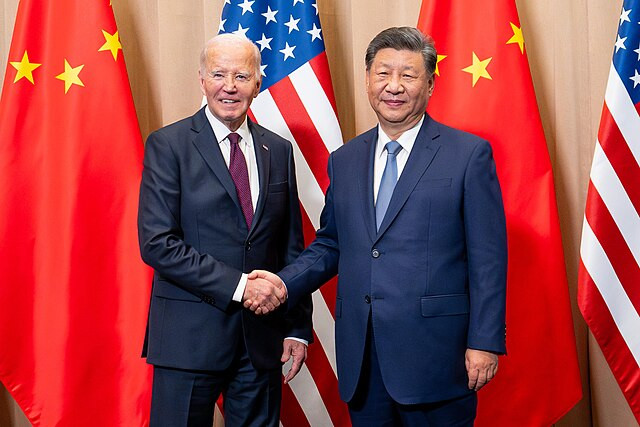In what may be the final high-stakes diplomatic engagement between President Joe Biden and Chinese President Xi Jinping, the two leaders convened for a two-hour meeting on the sidelines of the Asia-Pacific Economic Cooperation (APEC) forum in Lima, Peru. Xi used the platform to underscore four "red lines" that he said the United States must not cross, sending a strong signal to both Biden and incoming president-elect Donald Trump about China's non-negotiable stances.
The discussions between Biden and Xi were described as "frank and candid," with both leaders emphasizing their differences but acknowledging the need to manage competitive elements of the U.S.-China relationship responsibly. Xi framed the red lines as crucial to maintaining stability in bilateral ties, warning that challenges to these positions could lead to a "new Cold War"-a scenario he stressed "should not be fought and cannot be won."
According to a readout released by the Chinese Foreign Ministry, Xi's red lines encompass Taiwan, democracy and human rights, China's path and system, and the nation's right to development. He underscored the sensitive nature of the Taiwan issue, urging the U.S. to "handle the Taiwan question with extra prudence" and oppose any moves toward independence. Beijing considers Taiwan an inseparable part of its territory and has consistently expressed strong opposition to what it perceives as U.S. interference in cross-strait relations.
"The Taiwan question, democracy and human rights, China's path and system, and China's development right are four red lines for China," Xi emphasized. "They must not be challenged."
While Biden and Xi spoke about broader issues affecting U.S.-China relations, the shadow of Donald Trump's impending presidency loomed large over the talks. During his campaign, Trump vowed to impose steep tariffs on Chinese goods and has appointed staunch China hawks, such as Senator Marco Rubio and Congressman Mike Waltz, to key positions in his administration. Although Xi did not mention Trump by name, the readout of the meeting suggested that Beijing is preparing for a rocky relationship with the new U.S. administration.
"A new Cold War should not be fought and cannot be won. Containing China is unwise, unacceptable and bound to fail," Xi said, making clear China's stance on potential U.S. efforts to curb its influence.
The leaders' discussion touched on other contentious issues, including territorial disputes in the South China Sea. Xi reiterated that these matters must be resolved through "dialogue and consultation between states" and urged the U.S. to stay out of bilateral disputes over contested islands. He also criticized what he called the "small yard and high fence" policy-an apparent reference to U.S. efforts to block China's access to advanced technology.
Biden, in turn, raised concerns about China's support for Russia's defense sector and its reported provision of military components amid Russia's war in Ukraine. He condemned the deployment of North Korean troops to Russia and expressed alarm over what he described as a "dangerous expansion" of the conflict. The White House's readout highlighted Biden's reiteration of U.S. opposition to unilateral changes to the Taiwan status quo and a preference for peaceful resolution of disputes.
The diplomatic exchanges come at a critical juncture for U.S.-China relations, as tensions over trade, military posturing, and human rights remain unresolved. Xi's messaging appeared aimed not only at Washington but also at U.S. allies in the region, signaling China's intent to maintain its assertive posture while seeking cooperation where possible.
"Neither China nor the U.S. should seek to remodel the other according to one's own will, suppress the other from the so-called 'position of strength,' or deprive the other of the legitimate right to development so as to maintain its leading status," Xi told Biden.
Analysts say the red lines reflect China's strategic focus on preserving its domestic stability and protecting its interests in an increasingly volatile geopolitical environment. Bonnie Glaser, managing director of the German Marshall Fund's Indo-Pacific Program, noted that Xi's emphasis on democracy and human rights suggests China's growing confidence in redefining these terms. "Xi is attempting to persuade the U.S. that restraining [Taiwanese President] Lai Ching-te will advance U.S. interests in maintaining peace and stability in the Taiwan Strait," Glaser wrote on X, formerly Twitter.
Before concluding their meeting, Biden and Xi reflected on progress made since their last physical encounter, citing cooperation on issues such as counternarcotics and leader-to-leader military communication. Both leaders agreed that human control should remain a priority in decisions involving nuclear weapons, according to National Security Advisor Jake Sullivan.






